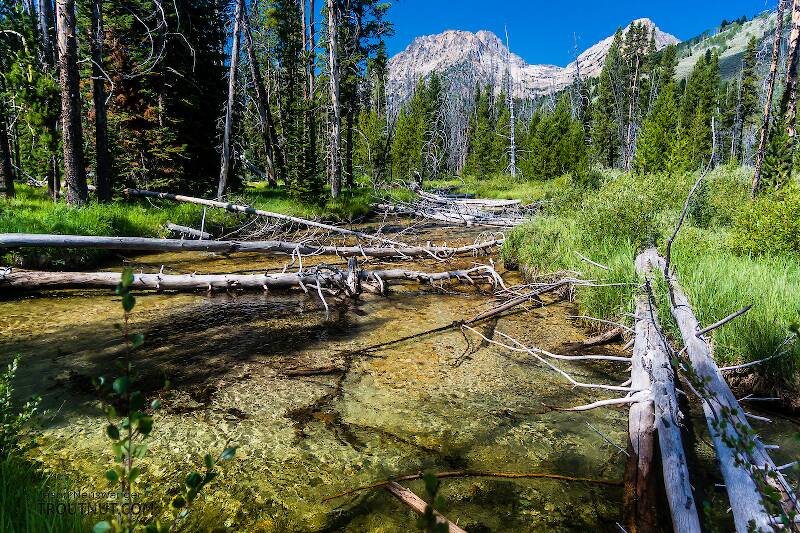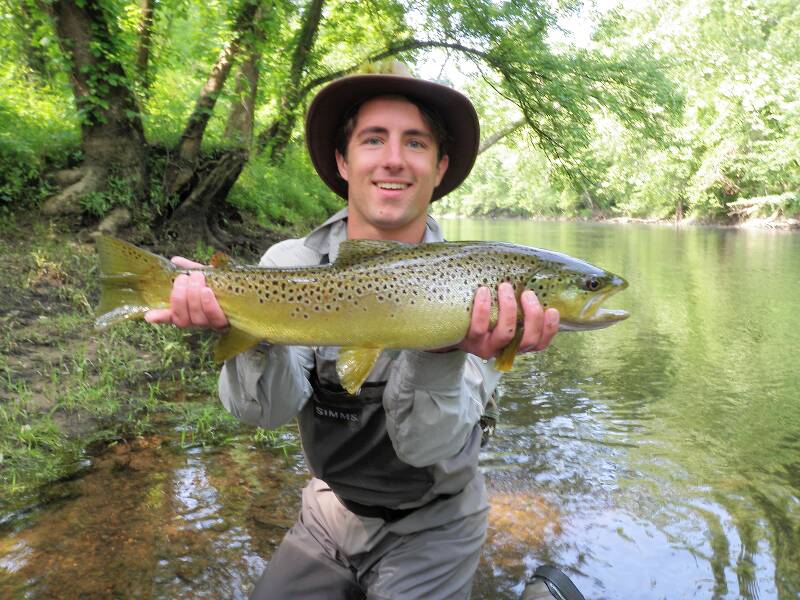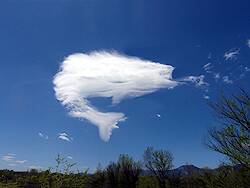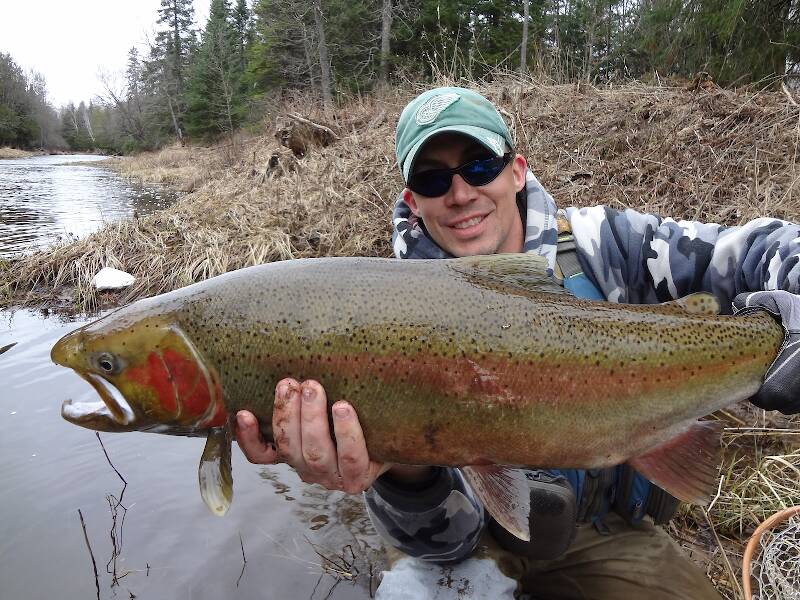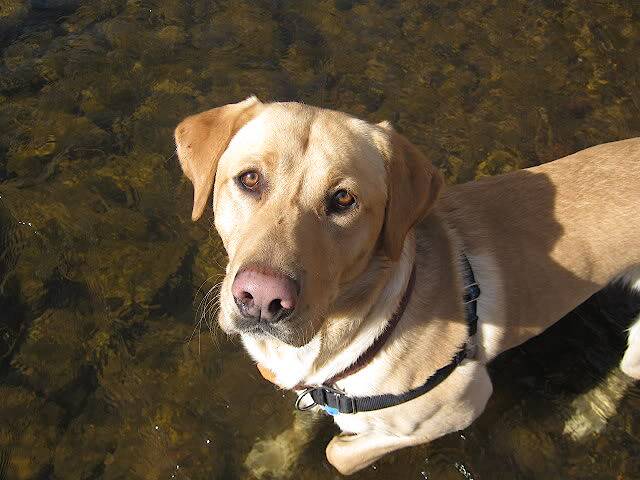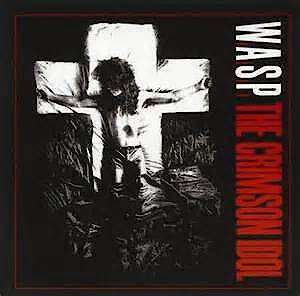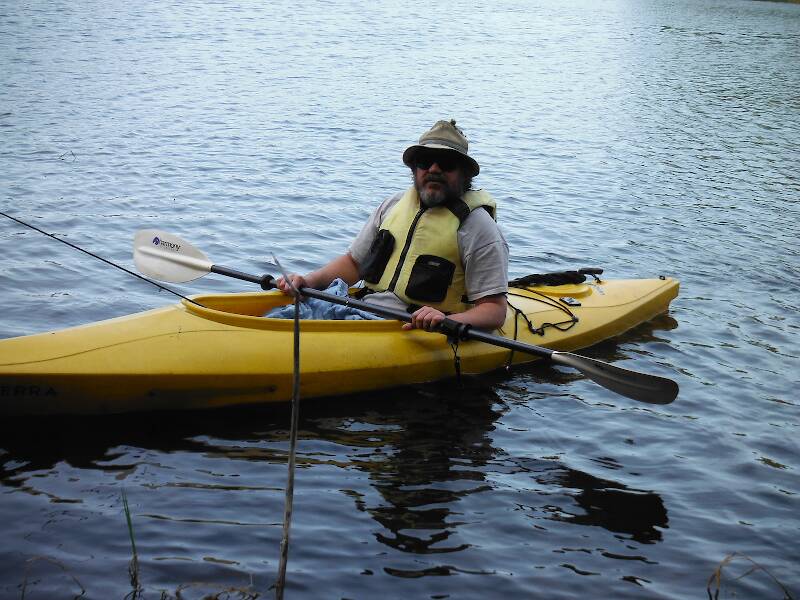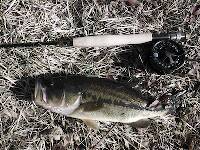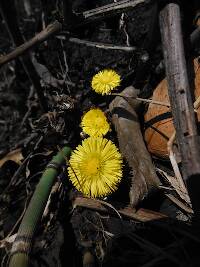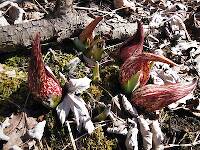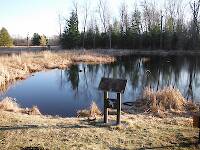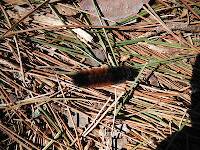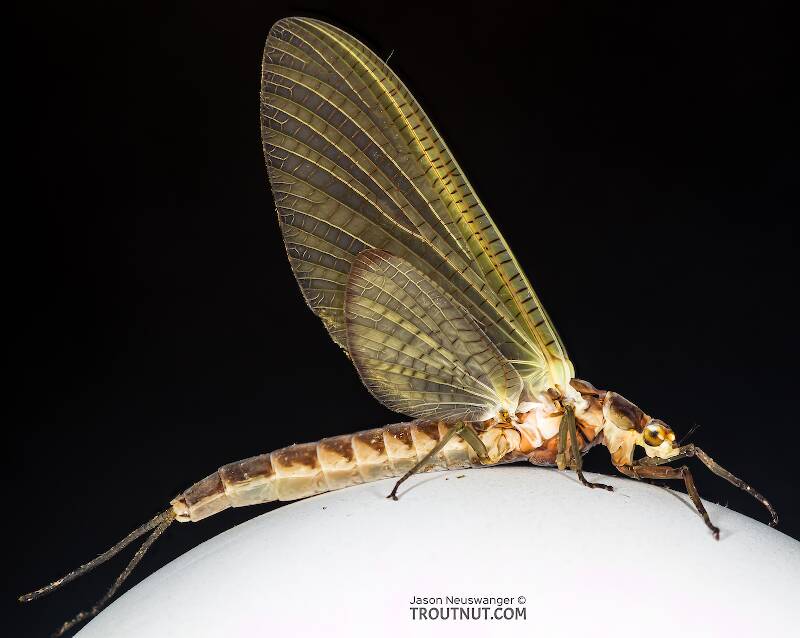
Hex Mayflies
Hexagenia limbata
The famous nocturnal Hex hatch of the Midwest (and a few other lucky locations) stirs to the surface mythically large brown trout that only touch streamers for the rest of the year.
Featured on the forum
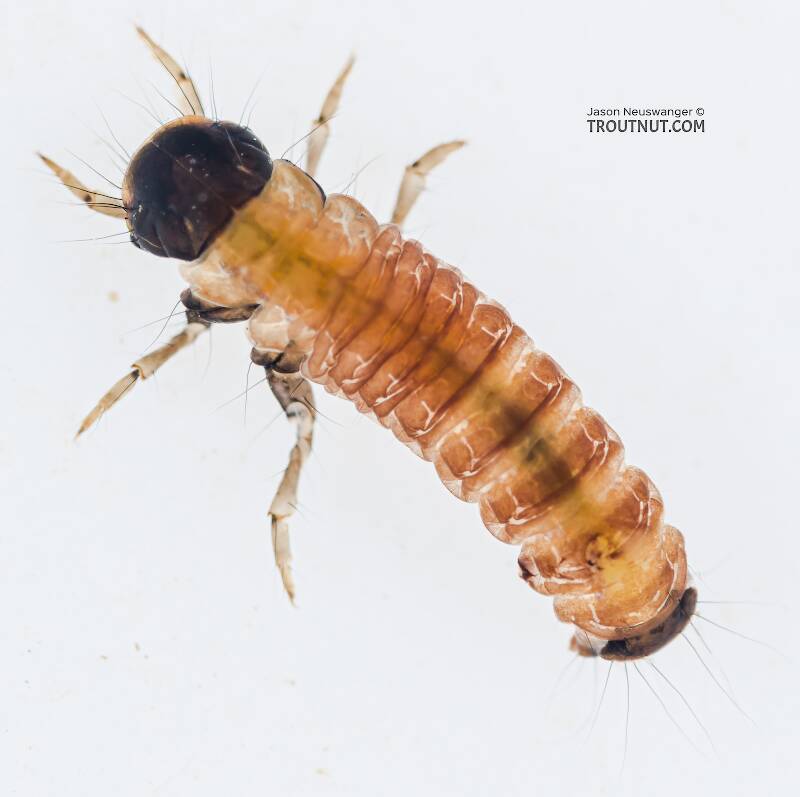
I caught this tiny larva without a case, but it seems to key pretty clearly to to Glossosomatidae. From there, the lack of sclerites on the mesonotum points to either Glossosoma or Anagapetus. Although it's difficult to see in a 2D image from the microscope, it's pretty clear in the live 3D view that the pronotum is only excised about 1/3 of its length to accommodate the forecoxa, not 2/3, which points to Glossosoma at Couplet 5 of the Key to Genera of Glossosomatidae Larvae.

Troutnut is a project started in 2003 by salmonid ecologist Jason "Troutnut" Neuswanger to help anglers and
fly tyers unabashedly embrace the entomological side of the sport. Learn more about Troutnut or
support the project for an enhanced experience here.
Strmanglr on Jan 4, 2012January 4th, 2012, 11:36 am EST
I'll agree interesting.
Here in Michigan there is now an advertisement from the state that wild boar are invasive and destructive. It urges citizens to shoot as many as they can, and it has no closed season.
There are a couple trout creeks I've heard of where Pike have a much lower minimum size so that more will be taken and they are less destructive to the trout.
I myself have killed a few dogfish in my local Pike river, in hopes of bettering the pike stock. I believe the Dnr recommends this action as well. But just think, the dogfish is more native than anything else, seeing as how long it's been around. The dead dogfish are thrown back into the river. Didn't I read a story about a dumping of dead salmon in rivers in Cali or somewhere out west, to improve nutrients in the river system.
I'm not trying to defend what you've done Jesse. I personally love catching smallmouth and couldn't kill them. Sunfish are pretty harmless. Both of these fish, like has been said, are certainly more native than the trout. I would be happy if I were you just to be catching fish and leave it at that.
Here in Michigan there is now an advertisement from the state that wild boar are invasive and destructive. It urges citizens to shoot as many as they can, and it has no closed season.
There are a couple trout creeks I've heard of where Pike have a much lower minimum size so that more will be taken and they are less destructive to the trout.
I myself have killed a few dogfish in my local Pike river, in hopes of bettering the pike stock. I believe the Dnr recommends this action as well. But just think, the dogfish is more native than anything else, seeing as how long it's been around. The dead dogfish are thrown back into the river. Didn't I read a story about a dumping of dead salmon in rivers in Cali or somewhere out west, to improve nutrients in the river system.
I'm not trying to defend what you've done Jesse. I personally love catching smallmouth and couldn't kill them. Sunfish are pretty harmless. Both of these fish, like has been said, are certainly more native than the trout. I would be happy if I were you just to be catching fish and leave it at that.
Jesse on Jan 5, 2012January 5th, 2012, 5:01 pm EST
Strmanglr my brother no worries! But certainly now i will be more cautious of the fish i catch and kill to try and do my own personal 'regulating'. But i will still make sure i have my limit on eatable fish that i come across when fishing for trout ;)
Most of us fish our whole lives..not knowing its not the fish that we are after.
http://www.filingoflyfishing.com
http://www.filingoflyfishing.com
PaulRoberts on Jul 30, 2012July 30th, 2012, 7:04 am EDT
Brookyman, what does a "spring block" look like? I'm curious (as usual).
Pryal74 on Jul 30, 2012July 30th, 2012, 9:13 am EDT
I am a member of an organization that keeps the ONLY section of managed and quality trout water in our whole county. Our funds stock and regulate Browns, Bows and Brooks. Biologists also look at breeding and growth of trout here. Right or wrong... the culling of smallmouth bass, northern pike and walleye in these areas helps maintain trout in the areas they have lived for many years.
The dam above the stretch of river we fish was opened a few years ago because of a pipe problem (that run under the river). When this happens we see those invasive species in our normal trout runs, occasionally. We were suggested to remove those species when they are caught.
I can see Jesse's situation is slightly different than mine. Maybe this is a wrong practice by law or someone's ethical standards, by I feel even if it only minutely helps the trout population, I will continue it. I agree with the people urging you to speak to a local biologist to see what they have to say.
There is a Lake Superior watershed that is a sanctuary for Coho Salmon and many trout also inhabit this small river. I was fishing there as a teenager and caught a small northern around 20 inches. It's stomach was filled with small to medium trout. He was the only pike I had witnessed in this stream, by pitching him into the forest, I feel I would save further trout and salmon and give the racoons or whoever a free meal.
Jesse, in my opinion, yes it can be against the law with certain species and size regulations, so, be mindful of those. I feel that you are, in the long run, helping the trout.
The dam above the stretch of river we fish was opened a few years ago because of a pipe problem (that run under the river). When this happens we see those invasive species in our normal trout runs, occasionally. We were suggested to remove those species when they are caught.
I can see Jesse's situation is slightly different than mine. Maybe this is a wrong practice by law or someone's ethical standards, by I feel even if it only minutely helps the trout population, I will continue it. I agree with the people urging you to speak to a local biologist to see what they have to say.
There is a Lake Superior watershed that is a sanctuary for Coho Salmon and many trout also inhabit this small river. I was fishing there as a teenager and caught a small northern around 20 inches. It's stomach was filled with small to medium trout. He was the only pike I had witnessed in this stream, by pitching him into the forest, I feel I would save further trout and salmon and give the racoons or whoever a free meal.
Jesse, in my opinion, yes it can be against the law with certain species and size regulations, so, be mindful of those. I feel that you are, in the long run, helping the trout.
-James Pryal
Into The Wild Fly Fishing
Into The Wild Fly Fishing
Strmanglr on Jul 30, 2012July 30th, 2012, 11:09 am EDT
"I am a member of an organization that keeps the ONLY section of managed and quality trout water in our whole county.Our funds stock and regulate Browns, Bows and Brooks. Biologists also look at breeding and growth of trout here. Right or wrong... the culling of smallmouth bass, northern pike and walleye in these areas helps maintain trout in the areas they have lived for many years. "
Only the brook trout could be native.
Only the brook trout could be native.
PaulRoberts on Jul 31, 2012July 31st, 2012, 12:02 pm EDT
Thanks Mack. Who else but anglers would really care enough to apply that elbow grease.
PaulRoberts on Aug 1, 2012August 1st, 2012, 9:31 am EDT
I see, you are opening up spring influxes to flow more strongly into the surface currents of the stream. Thanks for clarifying.
WestCO on Aug 10, 2012August 10th, 2012, 5:21 pm EDT
To correct something, its not pike minnows, its pike that are discouraged in the Colorado. Fish and Wildlife has made a ridiculous effort to protect pike minnows, formerly known as squaw fish, as well as a few other native fish in the Colorado. To the extent that they shock and "move" "invasive" fish like Smallies. Having a past in fishing Smallies, they're one of the greatest fish in the world on a fly. If you run across them on a stream, don't kill them, enjoy them. I used to fish smallies all the time when I was in college and I miss it dearly. The Colorado where I live is too warm to sustain trout and I wish they would let Smallies go and thrive because its a wonderful habitat.
And if you're going to go with the state of mind that smallies kill trout, well so do Browns and other large trout, so you're basically just picking between species. I personally don't think we have that right. I don't think anyone should introduce something like a Smallie to a place where they don't exist, but if they're already there and thriving, I say let them go. I do understand that there are perfectly valid arguments against this though. I selfishly just love smallies.
And if you're going to go with the state of mind that smallies kill trout, well so do Browns and other large trout, so you're basically just picking between species. I personally don't think we have that right. I don't think anyone should introduce something like a Smallie to a place where they don't exist, but if they're already there and thriving, I say let them go. I do understand that there are perfectly valid arguments against this though. I selfishly just love smallies.
...but fishermen I have noticed, they don't care if I'm rich or poor, wearing robes or waders, all they care about is the fish, the river, and the game we play. For fishermen, the only virtues are patience, tolerance, and humility. I like this.
PaulRoberts on Aug 11, 2012August 11th, 2012, 8:56 am EDT
I hear you on the smallies. I love them too. Problem is, in the Colorado, they aren't native but "recent" transplants. And they're outcompeting or outright devouring the native assemblage of cyprinids of the Colorado that are found nowhere else in the world.
Adirman on Aug 12, 2012August 12th, 2012, 2:55 am EDT
I hear you on the smallies as well, but you gots to protect those trout! Smallies don't need much protection and will usually thrive on their own; same caqn not be said for our beloved trout.
Gutcutter on Aug 12, 2012August 12th, 2012, 8:42 am EDT
Smallies don't need much protection and will usually thrive on their own
Really?
Ask anybody who fishes the Susquehanna how well they survive "on their own".
Do they all need our help, or should we just let Mother Nature figure it out.
I'll bet Yellowstone elk lovers are thrilled that the wolf was reintroduced...
All men who fish may in turn be divided into two parts: those who fish for trout and those who don't. Trout fishermen are a race apart: they are a dedicated crew- indolent, improvident, and quietly mad.
-Robert Traver, Trout Madness
-Robert Traver, Trout Madness
WestCO on Aug 12, 2012August 12th, 2012, 11:11 am EDT
I definitely understand that Paul. Like I said, my motivations are very selfish on the topic because of my time spent in SW Virginia. I wish we had a great smallie stream. I'm ignorant on why we are so responsible for maintaining a population of Pike Minnows and Humpback Chubs so I'm mold-able clay in that regard. I spend time and money conserving trout and waterfowl habitats so I don't think I'm completely insensitive on the topic, but for that population I just don't understand it.
Do explain the cyprinids though please. I started studying entomology about 3 years ago but mostly only as it pertains to the basics of may flies, caddis, stones, midges, and terrestrials. So forgive me if I don't know what you're talking about.
Do explain the cyprinids though please. I started studying entomology about 3 years ago but mostly only as it pertains to the basics of may flies, caddis, stones, midges, and terrestrials. So forgive me if I don't know what you're talking about.
...but fishermen I have noticed, they don't care if I'm rich or poor, wearing robes or waders, all they care about is the fish, the river, and the game we play. For fishermen, the only virtues are patience, tolerance, and humility. I like this.
PaulRoberts on Aug 12, 2012August 12th, 2012, 12:31 pm EDT
Oh...Cyprinids are the minnow family, of which the chubs and suckers belong. Apparently smallmouth eat too many young of those endangered minnows.
It's a controversial topic, esp so in your area. I certainly understand why. Practically speaking, who wants to fish for chubs and suckers (even if they are unique) when there could be smallmouths and pike?
It's a larger scale issue though, involving a wider range of people and ideas, centered on the pervasive loss of biodiversity that is occurring globally. That’s considered bad, ecologically and politically. Ecologically because ecosystems are complex and we don’t always know the ramifications down the line –we live in the short term, the planet is old. Politically because it really is a global community now and all have a stake in how the oceans, rainforests, temperate forests, and other biomes are treated. Disposing of native assemblages here is politically hypocritical. Thus there are federal and state mandates to protect indigenous species, and especially entire communities of specifically adapted species, such as exist in the Colorado River. It's considered the right thing to do.
As far as public opinion goes, the thinking is that smallmouths, as much fun as they are, are not in danger of being wiped from the planet. When species ARE in danger of being wiped form the planet, well, that's something that just sticks in a lot of people's craw -mine included. Even if they aren't "fun". Guess I have a difficult time justifying wiping out species/assemblages, and chipping away at something as precious as biodiversity.
Tough thing is, in this case, that if the native assemblage was restored, probably few people would really notice. Nice to know we did the right thing, but... what good are they to the local people on a daily basis? For most people probably, the native assemblage doesn't seem to balance out day to day against a great smallie fishery -at least to anglers and others that might benefit from tourism such a fishery would draw. Now maybe if 10-80lb pike minnows were again available -they might get noticed.
For what it’s worth, that’s my best shot at an explanation of the controversy, of the top of my head. Offered by someone who doesn't even live there.
It's a controversial topic, esp so in your area. I certainly understand why. Practically speaking, who wants to fish for chubs and suckers (even if they are unique) when there could be smallmouths and pike?
It's a larger scale issue though, involving a wider range of people and ideas, centered on the pervasive loss of biodiversity that is occurring globally. That’s considered bad, ecologically and politically. Ecologically because ecosystems are complex and we don’t always know the ramifications down the line –we live in the short term, the planet is old. Politically because it really is a global community now and all have a stake in how the oceans, rainforests, temperate forests, and other biomes are treated. Disposing of native assemblages here is politically hypocritical. Thus there are federal and state mandates to protect indigenous species, and especially entire communities of specifically adapted species, such as exist in the Colorado River. It's considered the right thing to do.
As far as public opinion goes, the thinking is that smallmouths, as much fun as they are, are not in danger of being wiped from the planet. When species ARE in danger of being wiped form the planet, well, that's something that just sticks in a lot of people's craw -mine included. Even if they aren't "fun". Guess I have a difficult time justifying wiping out species/assemblages, and chipping away at something as precious as biodiversity.
Tough thing is, in this case, that if the native assemblage was restored, probably few people would really notice. Nice to know we did the right thing, but... what good are they to the local people on a daily basis? For most people probably, the native assemblage doesn't seem to balance out day to day against a great smallie fishery -at least to anglers and others that might benefit from tourism such a fishery would draw. Now maybe if 10-80lb pike minnows were again available -they might get noticed.
For what it’s worth, that’s my best shot at an explanation of the controversy, of the top of my head. Offered by someone who doesn't even live there.
WestCO on Aug 12, 2012August 12th, 2012, 12:53 pm EDT
That's an excellent explanation. Like you alluded to, I think if I had a better understanding of the repercussions of losing those fish, I think I'd feel differently. I mean there are a lot of living things that live in our ecosystem, aquatic and otherwise that we don't protect and that we actually dispose of. Of course many of those things are parasitic or dangerous. I guess that's why I stay on the fence and only provide opinions on the matter by stating that its my selfish opinion. I've never taken action or even argued that we shouldn't protect those fish because I don't understand it well enough. Your explanation helped. On one side I think that anglers do more to support many strains of fish and bugs than many do so I shouldn't feel guilty that I don't care about those other fish, but on the other I don't think anyone has the right to play God. On a third hand, yeah I just made one, we're kind of playing God by trying to reintroduce and protect failing species, but then again they're failing because of urban interface. I don't know. Like I've been saying, I really wish that river was a great smallie habitat, I think it would get people off the couch, would bring people to town, would bring more to the DOW through fishing licenses, and I could go on and on. More fishermen fishing more is always a good thing in my opinion.
I'm definitely never in favor of people catching fish and dumping them on the bank though just to be clear.
I'm definitely never in favor of people catching fish and dumping them on the bank though just to be clear.
...but fishermen I have noticed, they don't care if I'm rich or poor, wearing robes or waders, all they care about is the fish, the river, and the game we play. For fishermen, the only virtues are patience, tolerance, and humility. I like this.
Jmd123 on Aug 13, 2012August 13th, 2012, 11:49 am EDT
Aldo Leopold, I believe, is the one who put it most perfectly:
If you completely disassembled an automobile engine, and didn't know what functions certain parts served - would you throw them away???
Most places on this planet where trout - and other fish species - are not doing well is due to the clumsy hands of mankind. Case in point, Tony's discussion of smallmouth on the Susquehanna - in this case it's heavy pollution damaging a renowned native fishery made famous by Bob Clouser amongst others. Where trout are not doing good, it can be because of pollution, but is generally from erosion/siltation, water warming, and introduction of non-native species. Mack's approach of enhancing natural coldwater flows by unblocking springs is probably the best way of dealing with the warming problem. Siltation and pollution are best dealt with by stopping the sources, which is best dealt with through education and in some cases legislation. The non-native species problem is probably the toughest nut to crack, especially since hatchery operations have spread fish around so widely and it's still an ongoing process though it seems to be getting better. Here now in Michigan, fisherman are REQUIRED to kill such non-native species as Asian carp and non-native gobies. I will certainly kill any that I found in trout or any other waters.
Perhaps the toughtest nut of all is the preservation of non-game species which are NOT highly valued by the public. I won't kill any native fish that I find in a trout stream. Here in Michigan, we have a tremendous variety of native gamefish species and they are often found in many different waters, some even in trout streams (I caught a largemouth in the Pine River, which holds mostly brookies and rainbows, and have also caught rock bass and pumpkinseed in there too). There is a case in which perch supposedly ruined a brook trout fishery, the place I call [REDACTED] Pond for security purposes, so any eating-size perch I catch there go home with me, but that's about it as far as killing the competition goes with me. Perch aren't exactly rare around here, though the Great Lakes fisheries for them fluctuate considerably.
OK, kind of a rambling post, but one more interesting point to make. Tony mentioned the impact on elk of reintroduction of wolves in Yellowstone. A few years ago there was a National Geographic article on the impacts caused by this reintroduction. Remarkably, this actually had an impact on trout fishing! Excessively high populations of elk, from lack of predation, were eating riparian vegetation down to the roots and removing cover, food sources, and shade from stream banks, which of course had detrimental effects to the trout populations. Sure, elk hunters and guides were happy, but too many elk were eating too much and not leaving enough food for other creatures. With the reintroduction of wolves and subsequent predation pressure, elk populations decreased but nearly everything else increased, including trout populations because their riparian cover began to grow back! Moral of the story? Let nature take its course, but where an important element is missing from the equation, add that element back and THEN let nature take its course!
Hope this adds domething to the discussion.
Jonathon
P.S. In a couple of weeks I will be going on a backpacking trip to Isle Royale National Park, where there are moose and wolves. Moose made it to the island several decades before the wolves and nearly ate the place bare! A little predation pressure on large herbivores is a good thing...
If you completely disassembled an automobile engine, and didn't know what functions certain parts served - would you throw them away???
Most places on this planet where trout - and other fish species - are not doing well is due to the clumsy hands of mankind. Case in point, Tony's discussion of smallmouth on the Susquehanna - in this case it's heavy pollution damaging a renowned native fishery made famous by Bob Clouser amongst others. Where trout are not doing good, it can be because of pollution, but is generally from erosion/siltation, water warming, and introduction of non-native species. Mack's approach of enhancing natural coldwater flows by unblocking springs is probably the best way of dealing with the warming problem. Siltation and pollution are best dealt with by stopping the sources, which is best dealt with through education and in some cases legislation. The non-native species problem is probably the toughest nut to crack, especially since hatchery operations have spread fish around so widely and it's still an ongoing process though it seems to be getting better. Here now in Michigan, fisherman are REQUIRED to kill such non-native species as Asian carp and non-native gobies. I will certainly kill any that I found in trout or any other waters.
Perhaps the toughtest nut of all is the preservation of non-game species which are NOT highly valued by the public. I won't kill any native fish that I find in a trout stream. Here in Michigan, we have a tremendous variety of native gamefish species and they are often found in many different waters, some even in trout streams (I caught a largemouth in the Pine River, which holds mostly brookies and rainbows, and have also caught rock bass and pumpkinseed in there too). There is a case in which perch supposedly ruined a brook trout fishery, the place I call [REDACTED] Pond for security purposes, so any eating-size perch I catch there go home with me, but that's about it as far as killing the competition goes with me. Perch aren't exactly rare around here, though the Great Lakes fisheries for them fluctuate considerably.
OK, kind of a rambling post, but one more interesting point to make. Tony mentioned the impact on elk of reintroduction of wolves in Yellowstone. A few years ago there was a National Geographic article on the impacts caused by this reintroduction. Remarkably, this actually had an impact on trout fishing! Excessively high populations of elk, from lack of predation, were eating riparian vegetation down to the roots and removing cover, food sources, and shade from stream banks, which of course had detrimental effects to the trout populations. Sure, elk hunters and guides were happy, but too many elk were eating too much and not leaving enough food for other creatures. With the reintroduction of wolves and subsequent predation pressure, elk populations decreased but nearly everything else increased, including trout populations because their riparian cover began to grow back! Moral of the story? Let nature take its course, but where an important element is missing from the equation, add that element back and THEN let nature take its course!
Hope this adds domething to the discussion.
Jonathon
P.S. In a couple of weeks I will be going on a backpacking trip to Isle Royale National Park, where there are moose and wolves. Moose made it to the island several decades before the wolves and nearly ate the place bare! A little predation pressure on large herbivores is a good thing...
No matter how big the one you just caught is, there's always a bigger one out there somewhere...
WestCO on Aug 13, 2012August 13th, 2012, 7:12 pm EDT
I think that Asian Carp situation trumps just about anything we have out here in the west. From what I know about those guys they are catastrophic. The only similar infestation we're potentially dealing with like that are Zebra Mussels. Those things terrify me. I completely understand why they have you guys kill the Asian Carp just like I completely understand why our reservoir patrols are so particular about inspecting boats. You probably know more about the mussels than I do because I believe they're rampant in the great lakes. If those things hit western rivers it could destroy that eco system.
...but fishermen I have noticed, they don't care if I'm rich or poor, wearing robes or waders, all they care about is the fish, the river, and the game we play. For fishermen, the only virtues are patience, tolerance, and humility. I like this.
Jmd123 on Aug 13, 2012August 13th, 2012, 8:06 pm EDT
Yep, we got those zebra mussels here and they are throwing things considerably out of whack. Although, while they may be affecting the pelagic food chain (open-water - algae being eaten by zooplankton being eaten by whitefish being eaten by salmon/lake trout), apparently the increased water clarity is allowing for increased weed growth, which in turn is leading to increasing populations of walleye, smallmouth, pike...so maybe, just maybe there is an upside to their presence. They say lake sturgeon eat them too, and we could use more lake sturgeon, they are native to these parts and have been depleted by overfishing and dam building. I'm sure it's going to take some time for the balance to be restored. But it's the Asain carp invasion that worries us the most right now - in Illinois they are on the order of 90% of the biomass in their rivers. SCREW THAT, I don't want an uncatchable fish that destroys habitat (weedbeds) for all other fish species taking over our ecosystems! I'll get my freaking 12 guage out and start killing them myself as they jump out of the water if it come down to that...
Jonathon
Jonathon
No matter how big the one you just caught is, there's always a bigger one out there somewhere...
Strmanglr on Aug 14, 2012August 14th, 2012, 8:27 am EDT
Jmd, did you hear about the sturgeon beds they are putting in the Detroit R. http://www.mnr.gov.on.ca/en/Business/GreatLakes/1ColumnSubPage/STDPROD_083583.html
I wondered if they would eat zebra mussels, as I understand it they only go about 35ft down to eat.
Anyway the gravel beds in Detroit R. are awesome. It's amazing what can happen with just a little care.
"I'll get my freaking 12 guage out and start killing them myself as they jump out of the water if it come down to that..."
lol, My friend said the same thing exactly. He said they should have competitions in those states now with the fish. What a picture, a bunch of people out on a lake firing off shotguns. You might be a redneck if . . .
I wondered if they would eat zebra mussels, as I understand it they only go about 35ft down to eat.
Anyway the gravel beds in Detroit R. are awesome. It's amazing what can happen with just a little care.
"I'll get my freaking 12 guage out and start killing them myself as they jump out of the water if it come down to that..."
lol, My friend said the same thing exactly. He said they should have competitions in those states now with the fish. What a picture, a bunch of people out on a lake firing off shotguns. You might be a redneck if . . .
Jmd123 on Aug 14, 2012August 14th, 2012, 9:01 am EDT
I used to work for a company called JJR in Ann Arbor that designed those sturgeon spawning beds, and from what I have heard they are working quite well, in fact another endangered fish species, the northern madtom (a tiny catfish no more than a few inches long), has been observed on these gravel beds as well.
As far as shotguns go for the Asian carp, it sounds like a lot of fun but also very dangerous! Especially as I'm sure that alcohol would get involved...
Jonathon
As far as shotguns go for the Asian carp, it sounds like a lot of fun but also very dangerous! Especially as I'm sure that alcohol would get involved...
Jonathon
No matter how big the one you just caught is, there's always a bigger one out there somewhere...
WestCO on Aug 14, 2012August 14th, 2012, 6:46 pm EDT
Why are Asian Carp uncatchable?
...but fishermen I have noticed, they don't care if I'm rich or poor, wearing robes or waders, all they care about is the fish, the river, and the game we play. For fishermen, the only virtues are patience, tolerance, and humility. I like this.
Quick Reply
Related Discussions
Topic
Replies
Last Reply
37
Dec 15, 2012
by GldstrmSam
by GldstrmSam
Five days of warmwater flyfishing in southeastern Michigan - from Jonathon
In Fishing Reports by Jmd123
In Fishing Reports by Jmd123
0
Jul 22, 2009
by Jmd123
by Jmd123

